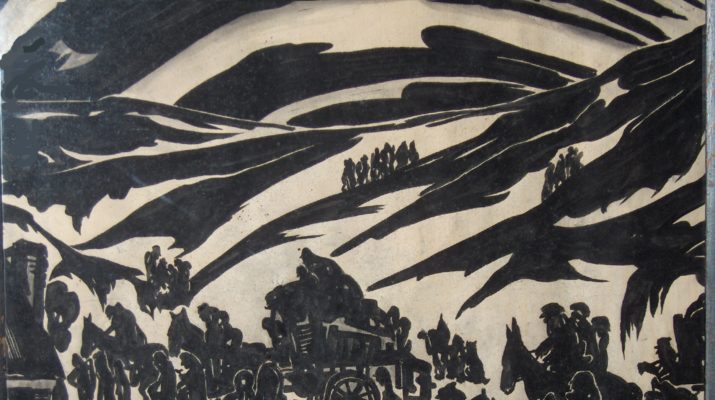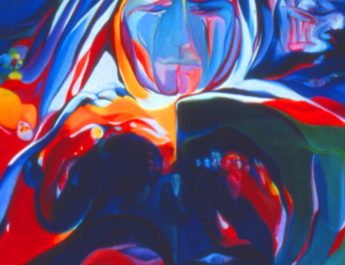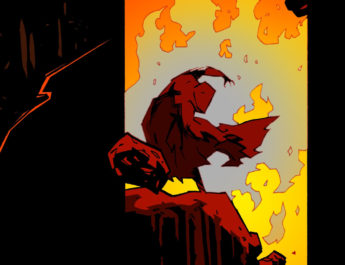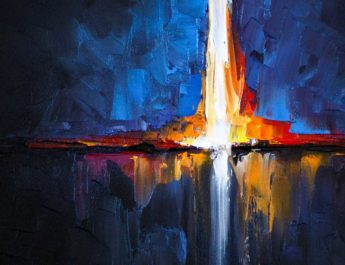Psalm 146:5-10
Third Sunday of Advent A
5 HappyA are those whose helpB is the GodC of Jacob,D
A “happy” = esher. From ashar (to go straight, lead, guide; to be level and so to be right, blessed, honest, happy). This is happy or blessedness.
B “help” = ezer. From azar (to help, protect, support, ally; properly, to surround so as to provide aid). This is help, aid, or helper. This word is used in Genesis 2:18 when God decides to make for Adam, “a helper as his partner.” If the same word can be used of God’s help (as in Psalm 121:1), then we should not downplay the significance of this formulation of “help.”
C “God” = El.
D “Jacob” = Yaaqob. From the same as aqeb (heel, hind part, hoof, rear guard of an army, one who lies in wait, usurper). This is Isaac’s son and his descendants. The name means heel-catcher or supplanter.
whose hopeE is in the LordF their God,G
E “hope” = seber. 2x in OT. From sabar (to examine, scrutinize, wait, expect hopefully). This is hope or expectation.
F “Lord” = YHVH. From havah (to be, become) or hayah (to come to pass, become, be). This is the name of the God of Israel, the self-existent and eternal one, the tetragrammaton. This pronunciation has been lost to time so “Lord” is generally used in its place.
G “God” = Elohim. Related to “God” in v5. See note F above.
6 who madeH heavenI and earth,J
the sea,K and allL that is in them;
H “made” = asah. This is to make, do, act, appoint, become in many senses.
I “heaven” = shamayim. Root may mean being lofty. This is sky, the air, or heaven. It is in a dual noun form so this might refer to the part of the sky where the clouds move on the one hand and the part beyond that where the sun, moon, and stars are on the other hand.
J “earth” = erets. Root may mean to be firm. This is earth, ground, field land, or country.
K “sea” = yam. Root may mean to roar. This is the sea, often referring to the Mediterranean. It comes from the root in the sense of the roar of crashing surf. This word is sometimes used for rivers or other sources of water. It can mean to the west or to the south.
L “all” = kol. From kalal (to complete). This is all or every.
M “keeps” = shamar. This is to keep, watch, or preserve. It means to guard something or to protect it as a thorny hedge protects something.
N “faith” = emet. From aman (to believe, endure, fulfill, confirm, support, be faithful, put one’s trust in, be steadfast. Figuratively, this is to be firm, steadfast, or faithful, trusting, believing, being permanent, morally solid). This is firmness or stability. Figuratively, it is faithfulness, truth, or trustworthiness. This is the same root that “amen” comes from.
O “forever” = olam. This is a long scope of time whether in the past (antiquity, ancient time) or in the future (eternal, everlasting).
7 who executesP justiceQ for the oppressed;R
P “executes” = asah. Same as “made” in v6. See note H above.
Q “justice” = mishpat. From shaphat (to judge, defend, pronounce judgment, condemn, govern). This is a verdict or formal sentence whether from humans or from God. It includes the act of judging as well as the place that judging takes place, the suit itself, and the penalty. Abstractly, this is justice, which includes the rights of the participants.
R “oppressed” = ashaq. This is to wrong, deceive, violate, or use oppression.
who givesS foodT to the hungry.U
The Lord sets the prisonersV free;W
S “gives” = natan. This is to give, put, set, offer. It is to give literally or figuratively.
T “food” = lechem. From lacham (to eat, feed on). This is bread, food, loaf. It can refer to food more generally for people or for animals.
U “hungry” = raeb. 16x in OT. From raeb (to be hungry or famished). This is hungry, a person who is hungry.
V “prisoners” = asar. This is to tie, yoke, bind, or fasten. It can mean to harness an animal, to join in fighting a battle, or to imprison someone.
W “sets…free” = nathar. 8x in OT. This is to jump, spring, undo, be greatly agitated, untie, or terrify.
8 the Lord opensX the eyes of the blind.Y
The Lord lifts upZ those who are bowed down;AA
the Lord lovesBB the righteous.CC
X “opens” = paqach. This is open, as opening one’s senses, particularly eyes. So, figuratively this can refer to being watchful.
Y “blind” = ivver. From avar (to blind, put out). This is blindness or someone who is blind. It can be used literally or figuratively.
Z “lifts up” = zaqaph. 2x in OT. This is to raise or lift up. Figuratively, it can mean to comfort.
AA “bowed down” = kaphaph. 5x in OT. This is to bend, bow, or curve. It is used for bowed down (as in oppressed), a bulrush bowing, and bowing before God.
BB “loves” = aheb. This is to love, beloved, friend. It is to have affection for sexually or otherwise.
CC “righteous” = tsaddiq. From the same as tsedeq (rightness, righteousness, just cause, vindication; that which is right in a natural, moral, or legal sense; abstractly equity; figuratively prosperity). This is just, innocent, righteous, righteous one, or lawful.
9 The Lord watches overDD the strangers;EE
he upholdsFF the orphanGG and the widow,HH
DD “watches over” = shamar. Same as “keeps” in v6. See note M above.
EE “strangers” = ger. From gur (to abide or sojourn; to leave the road to lodge or for any other reason). This is sojourner, guest, stranger, foreigner.
FF “upholds” = ud. This is to repeat, return, do again. This implies testifying something since that is a repetition. It can also mean to charge, admonish, protest, relieve, restore, or lift up.
GG “orphan” = yathom. This is a child without a father or more generally a person who is bereaved.
HH “widow” = almanah. Related to alman (widowed); from alam (to be silent, bound). This is a widow or a house that is desolate.
but the wayII of the wickedJJ he brings to ruin.KK
10 The Lord will reignLL forever,
II “way” = derek. From darak (to tread, march, to walk. Can also mean affixing a string to a box since one needs to step on it to bend it in the process; so also an archer). This is a road as a thing that is walked on. Can be used figuratively for the path that one’s life takes or how one chooses to live one’s life.
JJ “wicked” = rasha. This is morally wrong so it refers to someone who is actively bad as wicked, criminal, an evil person, offender, condemned, or ungodly.
KK “brings to ruin” = avath. 11x in OT. This is to be crooked, falsify, pervert, thwart, turn upside down, overthrow.
LL “reign” = malak. To be or become king or queen, to rise to the throne, to be crowned. By implication, to take counsel. This word may be from the Hebrew word for king “melek” or vice versa.
your God,MM O Zion,NN for all generations.OO
PraisePP the Lord!QQ
MM “God” = Elohim. Same as “God” in v5. See note G above.
NN “Zion” = Tsiyyon. Related to tsyiyyun (signpost, monument); from tsavah (to charge someone, to command, order); from the same as tsiyyah (dryness, drought); from a root meaning parched as desert, dry land. Zion can refer to a mountain in Jerusalem as well as another name for Jerusalem itself or the people.
OO “all generations” = dor + dor. Literally, “to generation and generation.” From dur (to move in a circle, which implies living somewhere or remaining there; it can also be the sense of piling or heaping up). This is a revolution of time, which is to say, an age or generation. It can also be a dwelling or one’s posterity.
PP “praise” = halal. This is to be clear – it originally referred to a sound, then a color. It was to shine and then make a show or boast then to rave. In a causative sense it came to mean celebrate, give glory, sing praise, or be worth of praise. Because of the celebratory nature of the word, it could also mean to give in marriage. This is where Hallelujah comes from.
QQ “Lord” = Yah. Related to “Lord” in v5. From YHVH (see note F above). This is Lord or God – a shortened form of God’s most holy name.
Image credit: “Migrants” by Gustaaf Sorel. Photo by Georges Jansoone, 2005.




